


xxxxxTurgenev’s first major work, A Sportsman’s Sketches of 1852, a series of short stories depicting the hard life endured by the peasant worker, played a part in the eventual emancipation of the serfs by Tsar Alexander II in 1861. He wrote a number of love stories dealing with social and political problems, including Rudin, A Nest of the Gentry and On the Eve, and among his most successful plays was A Month in the Country, a study of aristocratic life. His best-
IVAN TURGENEV 1818 -
Acknowledgements
Turgenev: detail, by the Russian painter Ilya Repin (1844-
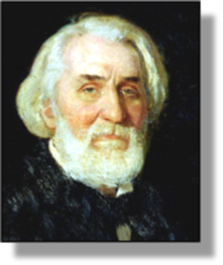 xxxxxTurgenev was born into a wealthy, landowning family at Oryol in the Ukraine. His father, a retired colonel in the imperial cavalry, died when he was sixteen, and he was brought up by his mother, a strict disciplinarian. It was during his childhood at Spasskoye-
xxxxxTurgenev was born into a wealthy, landowning family at Oryol in the Ukraine. His father, a retired colonel in the imperial cavalry, died when he was sixteen, and he was brought up by his mother, a strict disciplinarian. It was during his childhood at Spasskoye-
xxxxxHe attended the universities of Moscow and St. Petersburg, and then in 1838 went on to study philosophy at Berlin. It was here, during what he called his “plunge into the German sea”, that he became convinced that Russia needed to learn from the West. On his return three years later he worked for a short time as a civil servant in St. Petersburg, but he soon turned to writing as a living. He wrote some poetry in the 1840s -
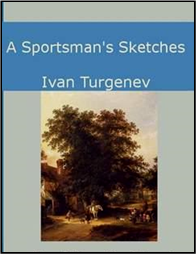 xxxxxFame as a writer came with his series of stories centred around the life of the landowners and their serfs in central Russia. Based on an earlier work entitled Notes of a Hunter, his A Sportsman’s Sketches of 1852 gave a sympathetic, well-
xxxxxFame as a writer came with his series of stories centred around the life of the landowners and their serfs in central Russia. Based on an earlier work entitled Notes of a Hunter, his A Sportsman’s Sketches of 1852 gave a sympathetic, well-
xxxxxA number of novels followed, notable among them being Rudin, A Nest of the Gentry and On the Eve. Depicting for the most part life in the country, they dealt with social and political problems, often by 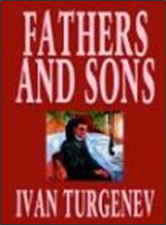 means of a love story, but they never became overtly revolutionary in tone. His masterpiece, Fathers and Sons, published in 1862, took as its hero the nihilist Bazarov, and examined the conflict between the older generation, reluctant to accept reform, and the keen radicalism of the younger generation – hence the title of the novel. It was remarkable for the quality of its character studies and for the depth of its probing, but its account, being well balanced, failed to please the advocates of either persuasion, and the book met with widespread hostility. This, together with quarrels with both Dostoevsky and Tolstoy, was partly the reason why Turgenev decided to leave Russia and settle in Baden Baden in southern Germany.
means of a love story, but they never became overtly revolutionary in tone. His masterpiece, Fathers and Sons, published in 1862, took as its hero the nihilist Bazarov, and examined the conflict between the older generation, reluctant to accept reform, and the keen radicalism of the younger generation – hence the title of the novel. It was remarkable for the quality of its character studies and for the depth of its probing, but its account, being well balanced, failed to please the advocates of either persuasion, and the book met with widespread hostility. This, together with quarrels with both Dostoevsky and Tolstoy, was partly the reason why Turgenev decided to leave Russia and settle in Baden Baden in southern Germany.
xxxxxWhen the Franco-
xxxxxWorthy of special mention among Turgenev’s other works were the novels Smoke and Virgin Soil, and the short stories First Love and Torrents of Spring, centred around love affairs -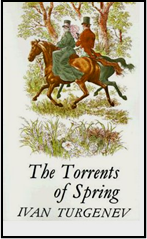 his fiction -
his fiction -
xxxxxTurgenev’s literary achievements were somewhat overshadowed in his day by the prominence given to the works of his highly talented contemporaries Dostoevsky and Tolstoy. In many respects, however, his novels were better balanced in their overall appraisal of high society and the plight of the downtrodden peasant, seen in a provincial setting. He was wholly concerned with the lives of the individuals he created, and saw no place in literature for a penetrating and often intrusive study of matters relating to the meaning of life. This objectivity, together with his clear, elegant style, his acute powers of description, and his brilliant character formation, made him one of Russia’s greatest novelists.
xxxxxTurgenev knew the great Leo Tolstoy from the mid-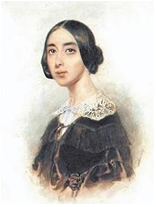 first Russian writer to acquire a European reputation.
first Russian writer to acquire a European reputation.
xxxxxIncidentally, Turgenev’sxmove to Baden-
xxxxx…… On his deathbed Turgenev, now reconciled with his old friend Tolstoy, called upon him to cast off his prophet’s mantle and return to writing fiction. It was perhaps in response to this plea that Tolstoy went on to write such works as The Death of Ivan Ilych and The Kreutzer Sonata, and produced his first play The Power of Darkness. ……
xxxxx……. All he wanted on his gravestone, Turgenev once said, was an acknowledgment that his book A Sportsman’s Sketches helped towards the liberation of the peasant worker. The value of these short stories in that respect is not really in doubt. Indeed, it has been suggested that they had as great an impact on the emancipation of the serfs as Uncle Tom’s Cabin of 1852 -
Vb-


